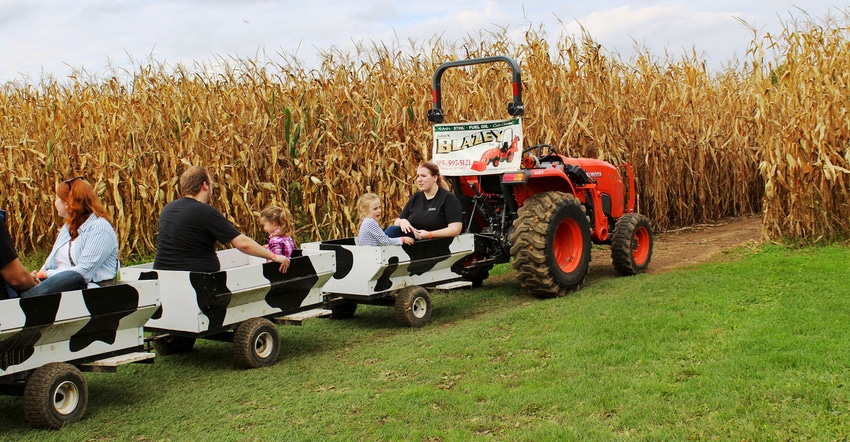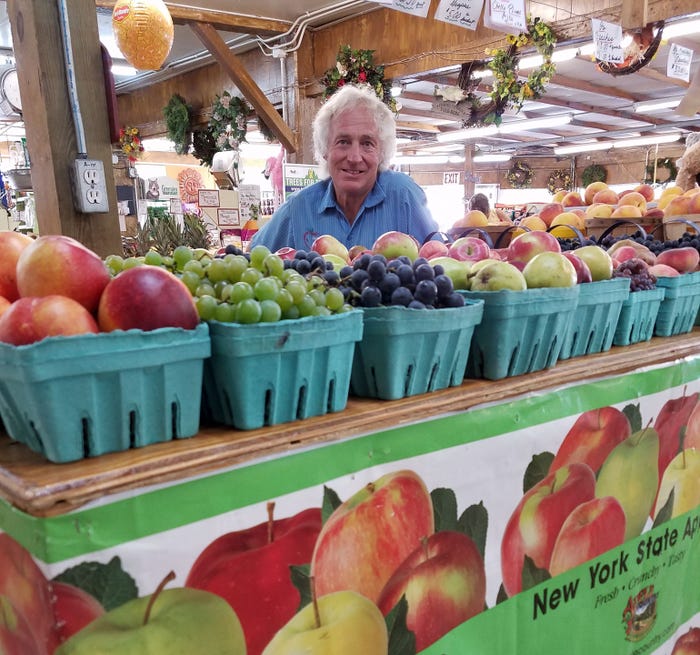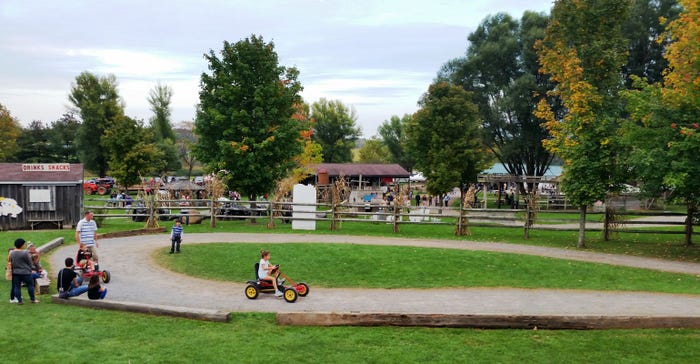September 1, 2020

For many farms that operate farm markets, the fall season is one of the biggest agritourism seasons of the year as they welcome families for hayrides, U-pick pumpkins and apples, and other fall-themed activities.
The coronavirus pandemic will make fall agritourism quite different for many farms.
Related: Complete coronavirus coverage
Most farms now require employees and guests to social distance and wear masks, and have installed additional handwashing stations, hand sanitizer pumps, and directional and policy signs.
At Beak and Skiff Apple Orchards in Lafayette, N.Y., Eddie Brennan, president, has made some tough choices for this season. With help from the farm’s coronavirus task force — employees who have worked toward formulating a plan to open the business — Brennan has planned how the farm will welcome visitors this fall.
Typically, 200,000 people visit during the eight-week apple picking season. They sample and buy at the 1911 Established brewery and cidery, explore the play equipment, and take wagon rides into the orchards.
This year, most of the farm’s activities will take place outside under four tents and in open areas around the farm. This includes seating for 500 people.
“We needed to rebuild our bakery and restaurants outside,” Brennan says. “It’s a much safer experience outside. A lot of the data says the virus transmits more inside.”
The farm has allocated a rear parking lot for more seating so guests can spread out more.
Visitors will be permitted inside the buildings but only at 50% capacity. The farm includes a market, tasting room, apple barn, bakery and distillery. Reducing capacity was especially problematic for the market since it was already crowded with goods and gifts.
To help reduce foot traffic in the building, Beak and Skiff has an ordering app so guests can scan a code at a picnic table and select the items they would like to buy, and employees then gather the items, bag them and take them outside. Naturally, this reduces impulse purchases, such as the sudden “need” for apple butter or those cute potholders near the checkout. But it’s the best the farm can do.
New York requires guests at establishments serving alcohol to purchase food along with their beverage. This is meant to encourage guests to sit down in one place with their drink rather than mingle with others. These extra sales could help Beak and Skiff sell more food and thus mitigate some of the effects of reduced shopping in the market. To meet this anticipated need, the farm purchased additional doughnut-making equipment.
Instead of the normal hayrides into the orchard, guests will have to walk out to the fruit trees. Brennan says that reducing the number of riders to accommodate social distancing would mean only four or so could ride on a wagon at a time.
In lieu of pony rides normally offered to children, the farm has added a new attraction this year: a hay bale mountain.
 TOUGH CALLS: Dennis Ouellette and his wife, June, (not pictured) normally host a Fall Jamboree at their farm in Sterling, N.Y., in late September, but they’ve had to cancel the event this year because of the coronavirus. The store in Oswego remains open.
TOUGH CALLS: Dennis Ouellette and his wife, June, (not pictured) normally host a Fall Jamboree at their farm in Sterling, N.Y., in late September, but they’ve had to cancel the event this year because of the coronavirus. The store in Oswego remains open.

It has been difficult for the farm to obtain what it needs this year.
“The supply chain for tents, picnic tables and to-go packaging has been difficult,” he says. “Syracuse University bought over 100 tents. It’s just down the road from us. I don’t think tent manufacturers were prepared. We’re a big producer of hard cider and it’s been hard to get containers.”
Despite the pandemic, he still hopes people will come out to the farm.
“I feel like people are looking for safe activities,” Brennan says. “The state fair was canceled, and football was, too. Apple picking is still a safe activity.”
Beak and Skiff reduced prices on weekdays for U-pick apples to incentivize guests to come to the farm.
Thinning the crowds
Brennan says that he’s relied on guidance from Cornell University on how farms can manage re-opening to the public for agritourism.
Normally, Beak and Skiff hosts nationally known acts and events. Brennan says that 10 booked weddings were canceled, and none of their concerts happened, either. The event venue, along with making it a destination for agritainment, has helped the operation grow in the past several years and provides a cushion against difficult years.
At Long Acre Farms in Macedon, N.Y., owner Joan Allen says the farm has had to alter visitors’ experience in a few ways.
“Fall is our big event. We lost all the weddings and corporate events,” Allen says.
The farm is also home to its sister business, JD Wine Cellars, which provides a tasting room and events space. Although that aspect of the business has diminished, the agritourism will continue but with tweaks. During the initial weeks of the pandemic, the farm offered drive-by pickups of farm goods.
In previous years, visitors to the Amazing Maize Maze would sit in a group for a “stalk talk” before entering the main part of the maze. Instead, large posters now line the maze’s entrance to inform visitors of safety rules.
Long Acre Farms has also canceled wagon rides, since transporting four people at a time instead of two dozen or so would make lines excessively long. But the mini train rides will continue since passengers normally ride spaced apart in the cars.
The farm is also using timed ticketing to reduce the number of people in the same place at the same time. Masks are required when social distancing isn’t possible.
Allen says that input from the North American Farmers’ Direct Marketing Association (now known as the International Agritourism Association) has helped the farm move forward with opening its fall events.
Long Acre Farms had a good year last year. Just before the pandemic hit, the farm built a new structure to replace the existing pavilion where visitors could sit and enjoy food purchased on the farm. The space now allows the farm to sell snacks from a walk-up window instead of indoors.
 MAKING CHANGES: Fall is normally a big time at Long Acre Farms in Macedon, N.Y., but many changes have been made this year, including a popular wagon ride for visitors.
MAKING CHANGES: Fall is normally a big time at Long Acre Farms in Macedon, N.Y., but many changes have been made this year, including a popular wagon ride for visitors.

“I look at it this way,” Allen says. “We’re an outside space, which is better than going into Walmart and the grocery store and Lowe’s. It’s pretty much what we do otherwise but stepped up.”
Wickham Farms in Penfield, N.Y., raises sunflowers, apples and strawberries, and has a farm store, Community Supported Agriculture operation, and seasonal agritainment.
Judy Valachovic, operations manager, says that the farm’s size has helped it stay open since visitors can spread out. Limiting entries to the farm will help control crowds. NAFDMA has helped the farm with its COVID-19 policies.
“We collaborate with and converse with them frequently,” Valachovic says. “We regularly talk with them. There are hundreds of other farms in this group. We share information so everyone can implement safe practices.”
The farm is monitoring the number of visitors by using online reservations as the only guaranteed way to visit. Walk-in guests are welcomed but only if the capacity has not been reached. The farm has also installed hand sanitizing stations and removed tables and chairs to encourage social distancing. Employees are regularly tested, as well.
The hayrides will continue, but visitors must wear masks. They’ve also moved the eating area to help thin crowds.
“We’ve had a great response,” she says. “People are excited to be here. From the reports I’m getting, everyone feels safe as they see the measures we have in place.”
Making adjustments
Ontario Orchards in Sterling, N.Y., normally hosts a Fall Jamboree the last weekend of September with games, a corn maze, wine tasting and slushies, and other activities. This year, it’s not happening.
“There’s just no way it could be done safely,” says farm owner June Ouellette.
Her biggest concern is the number of people in one place at a time, especially children.
“It was a very difficult decision,” she says. “A number of vendors were calling weeks ahead of time. Not all of them live around here and needed to make preparations. We didn’t feel that it was worth the chance.”
The farm’s store, nursery and greenhouse in Oswego is still open and, thanks to quarantine, its website has been very busy. The store sells a wide array of New York brands such as Grandma Brown Beans, Dinosaur Bar-B-Que Sauce and New Hope Mills, in addition to the usual gifts, produce and farm goods.
U-pick will also continue from mid-September through mid-October on weekends.
“We happen to be in a relatively safe area, and we want to see it stay that way,” Valachovic says.
Sergeant writes from central New York.
About the Author(s)
You May Also Like




